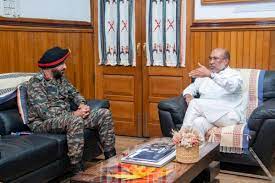The next step: On Manipur and the path to normalcy
Ethnicisation and poor governance are stumbling blocks to peace in Manipur
In the aftermath of a conflict, a return to normalcy must be a necessary basis to address the grievances of the affected parties that led to the conflict in the first place. There cannot be any redress when groups engage in wanton and targeted violence against each other, use blockades to prevent the transport of supplies, and continue to prevent displaced people from getting back to their homes. Return to normalcy is the first step before grievances are heard to prevent another conflict from emerging. And in order to effect the first step, peace talks between eminent representatives — from civil society and political parties — in the conflict and tamping down any embers of violence that might continue following the conflagration are a must. The presence of paramilitary forces and the appeal for peace by Union Home Minister Amit Shah after a visit to the tribal and the Imphal valley areas have helped stem the violence to an extent even if sporadic incidents of ethnic violence and arson have continued a month after the conflagration in Churachandpur, Imphal and other areas. But in terms of setting the conditions of peace which would entail the return of looted arms and the slow and sure return of those displaced to their battered homes, there has been little progress.
The Union government’s constitution of a peace committee comprising eminent public figures in the State has hit a snag with many of them refusing to join it or suggesting that they have been added to the committee without prior consultation. The success of a peace initiative requires that all groups in a conflict are represented and includes representatives with public standing or a record that transcends their identities. The withdrawal of quite a few public figures from this initiative unfortunately reveals the ethnicisation of civil society in Manipur and complicates peace building. More worryingly, Kuki-Zo representatives have expressly withdrawn their names as the committee included the Manipur Chief Minister, N. Biren Singh, while a Meitei civil society group has raked up an unwarranted generalisation of the issue as one related to “narco-terrorism” to withdraw from the committee. The government should still not give up on persuading prominent political and civil society representatives to talk with one another. The fact that it requires the aegis of the Union government to push the envelope on any further step on this issue also reveals the failure of the Biren Singh administration in retaining the confidence of all parties. It seems that it is time for the Union government and the ruling Bharatiya Janata Party to think of an alternative leadership that could ease the process of peace building as Mr Singh’s actions, both in the run-up to the violence and in its aftermath, have either been ineffectual or shown up an inability to govern effectively.
